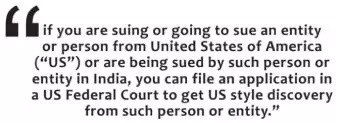Because of the width and breadth of US discovery procedure, a number of cases are settled before they go to trial. Such a procedure is provided for under 28 USC Section 1782
As all original side lawyers in India know, discovery is very narrow and restricted under the Code of Civil Procedure, 1908 ("CPC"). It cannot be "roving and fishing". An affidavit of document is conclusive except in limited circumstances. Interrogatories must be relevant and there is no discovery by deposition1. However, if you are suing or going to sue an entity or person from United States of America ("US") or are being sued by such person or entity in India, you can file an application in a US Federal Court to get US style discovery from such person or entity. US discovery procedure is extensive, can give much broader access to the US persons or entity's document and allow you to examine their witnesses and other relevant persons before you get to a trial. Additionally, such a procedure can be followed not just in a court of litigation but also in quasi-judicial or criminal investigations being conducted on the complaint of an Indian person or entity. Because of the width and breadth of US discovery procedure, a number of cases are settled before they go to trial. Such a procedure is provided for under 28 USC Section 1782.
28 USC SECTION 1782 PROVIDES
"(a) The district court of the district in which a person resides or is found may order him to give his testimony or statement or to produce a document or other thing for use in a proceeding in a foreign or international tribunal, including criminal investigations conducted before formal accusation. The order may be made pursuant to a letter rogatory issued, or request made, by a foreign or international tribunal or upon the application of any interested person and may direct that the testimony or statement be given, or the document or other thing be produced, before a person appointed by the court. By virtue of his appointment, the person appointed has power to administer any necessary oath and take the testimony or statement. The order may prescribe the practice and procedure, which may be in whole or part the practice and procedure of the foreign country or the international tribunal, for taking the testimony or statement or producing the document or other thing. To the extent that the order does not prescribe otherwise, the testimony or statement shall be taken, and the document or other thing produced, in accordance with the Federal Rules of Civil Procedure. (emphasis applied) A person may not be compelled to give his testimony or statement or to produce a document or other thing in violation of any legally applicable privilege.
This section allows a person or entity sued or about to be sued by a US person or entity or who sues or is about to sue a US person or entity in a country outside US to get broad US discovery from such person or entity through a Federal Court in US.

The United States Supreme Court, in Intel v. Advance Medical Devices ("AMD"), 542 US 241, dealt with a request for discovery filed by AMD against Intel under S. 1782 in connection with an antitrust complaint filed by AMD with European Competition Commission. The Supreme Court held that (i) AMD is an "interested person"; (ii) The Competition Commission is a "Tribunal" when it acts in a first instance; (iii) the "proceedings" for which the discovery is sought need not be pending or imminent but must be in reasonable contemplation, and most important, (iv) §1782(a) contains no threshold requirement that evidence sought from a federal district court would be discoverable under the law governing the foreign proceeding. In other words such documents and depositions can be taken even if they are not discoverable under the laws of the country where the proceedings or proposed proceedings will take place. The only exception is that the discovery should not be in violation of any legally applicable privilege.
The US courts have gone further2 and have allowed discovery of documents held by a subsidiary of the US entity outside US. Two US Courts of Appeal have held that S. 1782(a) allows discovery of documents held by branches or subsidiaries of the US entity outside US.
One other significant advantage of using Section 1782 is that an Indian entity does not have to wait for litigation to start against the US person or entity. An interested person can make such a discovery request before filing a case or starting such a proceeding. In the AMD case the United States Supreme Court held that AMD, which had merely filed a complaint against Intel before the Director General, Competition in Europe could do so before the complaint was investigated and a decision was made to proceed against Intel.
In recent years, there has been an increase in the number of applications filed in US Federal Courts under Section 1782. More foreign persons and entities are filing applications to take advantage of broad discovery laws in US.
Footnotes
1 Federal Rules of Civil Procedure and State Rules allow both sides in a civil litigation to summon and examine witnesses before a trial and in the presence of reporter by using a procedure called discovery by deposition.
2 There is a difference of opinion among courts on the issue of discovery of documents or depositions located outside US at a branch or subsidiary of the US entity under S.1782. At some stage this will be resolved.
Originally Published by Legal Era
The content of this article is intended to provide a general guide to the subject matter. Specialist advice should be sought about your specific circumstances.

